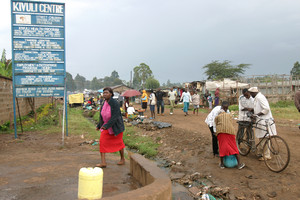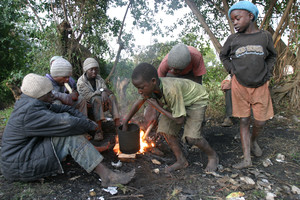Dreaming of education
José António M. Rebelo
Comboni Missionary
Nairobi is one of the cities with many street children. It is estimated that there are over 60,000 children in the streets of the city. The Koinonia community, among all other initiatives to help them, has a rescue center in Kibera, the second biggest slum South of Equator, after Soweto’s in South Africa.
The center is a stone’s throw from the railway where the throng’s fury unleashed violently in the wake of the proclamation of the results of a presidential election marred by irregularities. (See box). Two social workers, Jack Matila, 26, and Boniface Okada, 27, are in charge of the center.
The day I visited it last March, only Jack was present (Boni was attending university classes). Jack entered Koinonia community in 2004. Before, he was working as a teacher employed by parents (PTA teacher). He came to know what Father Kizito was doing and accepted to become a volunteer. It was an opportunity to change and grow humanly and spiritually, as he admits: “Meeting the children in Koinonia – children who need love and attention – led me to change my life and views. I have grown spiritually. Before, I believed that work had to be paid. I learned that one should give fully and joyfully without expecting recompense. I joined Koinonia to give, not to receive. I may die poor, but in God’s sight I am rich. I have changed. Fr. Kizito made me who I am now.”
Social workers receive a small allowance, not a salary, and have their school fees paid, otherwise they could not sustain themselves. Volunteers must have a job to survive. The founder of the community and soul of the project, Father Renato Kizito Sesana, prefers to have them full-time or part-time if they are studying so that they will be more dedicated to their work.
Jack studied community development, got a higher diploma and he is now applying for a degree. He notes that it is not easy to work with street children: “One loses friends when he/she is with underprivileged and dirty children. People look at us as someone who has no future.”
Boarding preparations
Twelve street children out of a batch of 25 being followed up in town were there. They had come to spend the day. In the evening, they would go back to their bases – the places where they keep their little belongings and sleep. They were busy preparing breakfast. It seemed a common task. But there was order, even while the social worker went out to buy bread. The older ones led the operations and then served their peers. Everybody had plenty to eat – of porridge relished with dry fish, bread spread with butter, and tea. That morning, after the washing up and while the social worker was busy, they relaxed, watched television and enjoyed some play-station games.

Those days, children were being monitored closely and given time to know each other before being taken as boarders at the beginning of the following month of April. They seemed eager to have a protective roof over them as soon as possible, as the rainy season had just started. By then, as Jack explained, they should have improved their behavior like: fighting no more with others, have stopped taking drugs and stealing. These were some of the requisites to be admitted. And it was the beginning of their rehabilitation and reintegration into family and society.
From April to December and after a medical check up, they would undergo informal education in the Center before moving, in December, to one of the Koinonia houses for street children. During those months, different activities are proposed to them. Jack lists some: “They have some sessions to identify the particular class they will enter in January; bible study, to learn that we are all equal, to experience they are loved by God and to grow in the spirit of love and sharing; boy scout activities, to grow in responsibility towards others and the environment; hygiene and discipline tips and how to live as a family. They also undergo some counseling to help them overcome psychological wounds.”
According to Jack, the most common reasons that bring them to the streets are: death of parents; poverty; alcoholic parents who do not care for them; traumatizing domestic violence; family breakdown: for instance, mother dies and father marries another woman; even, lack of love. He exemplifies: “Last year, there was a boy from a rich family who felt so unloved that he preferred to die than to go back.”
Warm children
A few days later, Jack brought me to one of the children’s bases along a very busy road in a well-off area not far from Kibera. It was evening. In a city like Nairobi located in a plateau, temperatures drop at night. They were around a fire made of a car tire, warming some sausages in a worn out 5-liter paint tin to appease their grumbling stomachs, before wrapping themselves in some muddy torn rags to sleep.
There was no shelter. They were going to sleep under the sky, bearing the cold and the rains. They hadn’t washed for some time. Their clothes were filthy too. As dusk fell, they became darker than the night. Rain was threatening. The temperature was dropping. Around the improvised fire to keep them warm, seated on stones, only their big scleras (white part of the eye) could be seen.
Children were very pleased to see me again. They all came to greet – with a handshake or a touch with the knuckles. They greeted warmly as if we had a longstanding friendship while I had spend just a few hours with them in the drop-in center. When Fr. Kizito appeared, they scrambled to greet him. The sense of joy and affection was unequivocal. The weather rigors might have hardened their skins, the dangers and disappointments wounded their spirits, but their hearts are warm and able to recognize who is on their side and loves them.
Heartbreaking stories
The reasons that brought them to the street vary, but the abuses they are daily subjected to are very similar. Their common fate brought them together and made strong bonds among them. The street is not an option; it is a desperate escape from an unbearable situation. But it is like jumping from the frying pan into the fire.
They didn’t mind to recount their life dramas and be photographed. But, as they were recalling their stories, sadness was evident on their faces.
Kevin Lomnyek, 14, is a Maasai from Tanzania. He left home at Kangemi, where his parents are staying with his two sisters, when he was 11. They were starving at home, after his parents lost their jobs. In the street, he met some older children who were harsh on him. In the beginning, they beat him to steal his little money to buy cigarettes. Then he was raped by an older colleague. Paolo came very drank and excited, probably under the influence of drugs and after watching a hard-core movie, he assaulted Kevin. He grabbed his neck and threatened him with a broken bottle. Kevin, being weaker, had no alternative but to keep quiet while being sodomized.
Clinton Malova, 14, is an orphan. His parents died of AIDS in 1998. He and his younger brother went to live with their uncle. They were given little food. One day, they were denied food completely. They went to the street. (Victor, 9, was in serious risk and has been rescued by the Koinonia team. He now lives in Ndugu Mdogo Home.)

The boy named after the ex-American President Bill Clinton, feels very sad because the community fears him. He is seen as a threat – to people’s security and peace – while he is only a victim. He is in the streets out of despair, because he was forced to.
David Curia, 10. Wanting to be older, he kept saying he was 13, but was the youngest of that group. In fact, he is the second oldest of seven brothers (the others stay in Dagoreti). The mother died and his father remarried. The stepmother was always beating him so cruelly that he ran away.
His experience in the streets has been very tough. He was already arrested, made to work and released during the night. He confesses that often he goes to sleep with an empty stomach. Now things have improved because he is going already to the rescue center where he can get breakfast and lunch.
Chased by all
Where do they get their daily bread? From selling the rubbish they collect. As morning starts, they roam the streets with a large fiber bag – it is easy to spot them around, especially in the morning – collecting what can be of some value in exchange of a few coins to help them eke out a living. These street children have more trust in the garbage than in people’s alms.
They are not free. Chased by the community and beaten up by the police and the City Council employees, they have to watch their backs and be on the run constantly. Kevin says that sometimes the police arrest them, make them work and beat them up in the police station before releasing them.
Jack, the social worker, comments that, last year, they beat 20 of them so badly that they had to be taken to hospital. The treatment of just one of them at the Coptic Hospital costed Fr. Kizito 50,000 shillings.
Dreams alive
Kevin is able to read just a bit of Kiswahili and English. It was long ago that he left school, but he hopes to be given the opportunity to study and become an engineer of cars and, eventually, of airplanes.
Clinton left school in 2006. He still needs three years to finish primary school. But he hopes to be given the opportunity to go back and study to become an airplane pilot. A sign that his dreams are still high!
David left school in 2004. He wants to be a movie actor.
The streets didn’t kill their dreams. That evening, they were luckier than usual: they didn’t enter their “lairs” to sleep with empty stomachs. Before leaving, I ensured they would get some supper. In April, they were welcomed in the drop-in center and their dream of getting an education started coming true.



